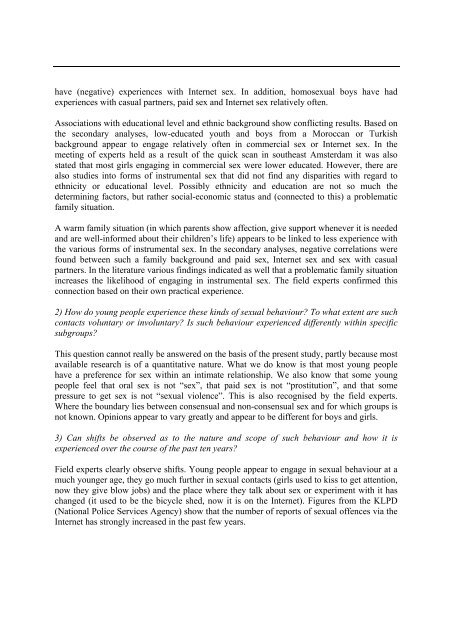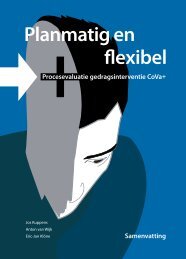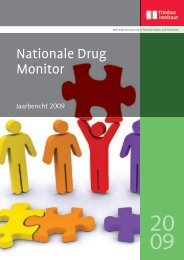Tienerseks; vormen van instrumentele seks onder tieners - WODC
Tienerseks; vormen van instrumentele seks onder tieners - WODC
Tienerseks; vormen van instrumentele seks onder tieners - WODC
Create successful ePaper yourself
Turn your PDF publications into a flip-book with our unique Google optimized e-Paper software.
have (negative) experiences with Internet sex. In addition, homosexual boys have hadexperiences with casual partners, paid sex and Internet sex relatively often.Associations with educational level and ethnic background show conflicting results. Based onthe secondary analyses, low-educated youth and boys from a Moroccan or Turkishbackground appear to engage relatively often in commercial sex or Internet sex. In themeeting of experts held as a result of the quick scan in southeast Amsterdam it was alsostated that most girls engaging in commercial sex were lower educated. However, there arealso studies into forms of instrumental sex that did not find any disparities with regard toethnicity or educational level. Possibly ethnicity and education are not so much thedetermining factors, but rather social-economic status and (connected to this) a problematicfamily situation.A warm family situation (in which parents show affection, give support whenever it is neededand are well-informed about their children’s life) appears to be linked to less experience withthe various forms of instrumental sex. In the secondary analyses, negative correlations werefound between such a family background and paid sex, Internet sex and sex with casualpartners. In the literature various findings indicated as well that a problematic family situationincreases the likelihood of engaging in instrumental sex. The field experts confirmed thisconnection based on their own practical experience.2) How do young people experience these kinds of sexual behaviour? To what extent are suchcontacts voluntary or involuntary? Is such behaviour experienced differently within specificsubgroups?This question cannot really be answered on the basis of the present study, partly because mostavailable research is of a quantitative nature. What we do know is that most young peoplehave a preference for sex within an intimate relationship. We also know that some youngpeople feel that oral sex is not “sex”, that paid sex is not “prostitution”, and that somepressure to get sex is not “sexual violence”. This is also recognised by the field experts.Where the boundary lies between consensual and non-consensual sex and for which groups isnot known. Opinions appear to vary greatly and appear to be different for boys and girls.3) Can shifts be observed as to the nature and scope of such behaviour and how it isexperienced over the course of the past ten years?Field experts clearly observe shifts. Young people appear to engage in sexual behaviour at amuch younger age, they go much further in sexual contacts (girls used to kiss to get attention,now they give blow jobs) and the place where they talk about sex or experiment with it haschanged (it used to be the bicycle shed, now it is on the Internet). Figures from the KLPD(National Police Services Agency) show that the number of reports of sexual offences via theInternet has strongly increased in the past few years.
















